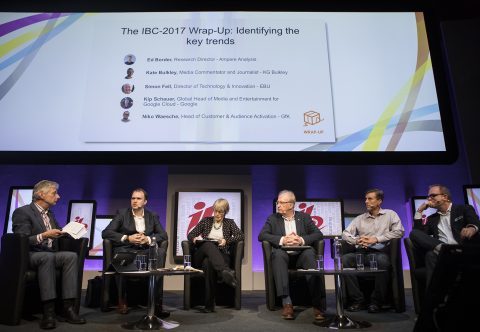
The year’s IBC has underlined that broadcast is poised on the verge of a pivotal transformation.
IABM director of strategic insight John Ive said that this year’s event was particularly significant because of the palpable increase in the pace of change.
“It’s been quite a pivotal year,” said Ive at the ‘IBC Wrap Up’, aimed at identifying key trends at this year’s exhibition. “I have a feeling things are going to change very rapidly over the next five to 10 years, affecting all aspects from content creation to delivery.”
Niko Waesche, global head of customer and audience activation at research company Gfk, added: “IBC has been very exciting – like a train gaining momentum.”
One of the busiest areas of the show was the IP Showcase – underlining the significance of IP-based production, said EBU director of technology and innovation Simon Fell.
“The showcase was demonstrating next-generation production and ‘dematerialisation’ – putting broadcast production into virtualised space. Everyone is waiting on the SMPTE 2110 standard for IP with many betting the farm on that one; it has to work.”
Fell added: “We have members already building studios designed with flexible workspaces with 2110 in mind. Studios will be very different places, needing a new generation with skills that will thrive on IP infrastructure.”
In addition to the pace of technological change, Waesche identified the keys to the future of success in media. “Media companies will be successful if they do two things right; produce great content and create great data. That’s where Facebook, Amazon and [Chinese e-commerce company] Alibaba have a massive advantage
over the rest.”
The holy grail is to combine audience data such as location with advertising, said Waesche. “Advertisers such as Heineken want to reach people at the time they are most likely to buy a beer.”
The development of AI and machine learning in the industry was another big trend, said Google Cloud global head of media and entertainment Kip Schauer.
“Companies have begun to integrate it. Things like shot/scene detection change will be able to create quick edits at sports events to be pushed to social media. That’s where I see ML creating new experiences for us – allowing more content to be distributed to more people.”






